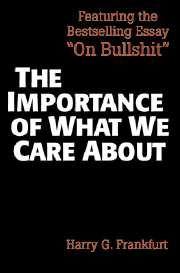Book contents
- Frontmatter
- Contents
- Preface
- Sources
- 1 Alternate possibilities and moral responsibility
- 2 Freedom of the will and the concept of a person
- 3 Coercion and moral responsibility
- 4 Three concepts of free action
- 5 Identification and externality
- 6 The problem of action
- 7 The importance of what we care about
- 8 What we are morally responsible for
- 9 Necessity and desire
- 10 On bullshit
- 11 Equality as a moral ideal
- 12 Identification and wholeheartedness
- 13 Rationality and the unthinkable
8 - What we are morally responsible for
Published online by Cambridge University Press: 05 June 2012
- Frontmatter
- Contents
- Preface
- Sources
- 1 Alternate possibilities and moral responsibility
- 2 Freedom of the will and the concept of a person
- 3 Coercion and moral responsibility
- 4 Three concepts of free action
- 5 Identification and externality
- 6 The problem of action
- 7 The importance of what we care about
- 8 What we are morally responsible for
- 9 Necessity and desire
- 10 On bullshit
- 11 Equality as a moral ideal
- 12 Identification and wholeheartedness
- 13 Rationality and the unthinkable
Summary
It might have been expected that the freedom of a person's will would most naturally be construed as a matter of whether it is up to him what he wills. In fact, it is generally understood as having to do with whether it is up to the person what he does. Someone's will is regarded as being free at a given time, in other words, only if at that time it is up to him whether he does one thing or does another instead. When this conception of free will is joined to the supposition that free will is a necessary condition for moral responsibility, the result is the Principle of Alternate Possibilities (PAP): a person is morally responsible for what he has done only if he could have done otherwise.
For those who accept PAP, it is an important question whether people ever can do anything other than what they actually do. Incompatibilists maintain that if determinism is true, this is not possible. On the other hand, compatibilists insist that even in a deterministic world a person may have genuine alternatives in the sense PAP requires. In my view, PAP is false. The fact that a person lacks alternatives does preclude his being morally responsible when it alone accounts for his behavior. But a lack of alternatives is not inconsistent with moral responsibility when someone acts as he does for reasons of his own, rather than simply because no other alternative is open to him.
- Type
- Chapter
- Information
- The Importance of What We Care AboutPhilosophical Essays, pp. 95 - 103Publisher: Cambridge University PressPrint publication year: 1988
- 5
- Cited by

